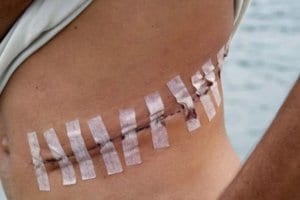Hossam Reda Ghalab
Tanta, Egypt
 |
| A scar left on a kidney trafficking victim. |
Healthcare for the indigent in developing countries often leaves much to be desired. Organ trafficking is rampant, its prevalence rising alarmingly and for some constituting a thriving business. In Egypt, each year hundreds of poor Egyptians sell their kidneys and livers in order to feed their families or pay off debts. Organ harvesting is carried out by clandestine mafia rings in unlicensed and even licensed medical centers, and laws passed to curb the trade have been ineffective. Across the country children are abducted almost daily and have their organs removed. Regrettably some doctors participate in these nefarious activities and profit from them.
Healthcare often tends to be in the hands of non-professional personnel, sometimes with disastrous results. Males are circumcised by barbers, females by uneducated midwifes or hairdressers. Eye diseases are treated by barbers or uneducated religious persons. In shantytowns, slums, and remote rural areas superstition and ignorance reign supreme and medical care is unavailable or not valued. My father was delivered at home by an uneducated midwife and later circumcised by a barber. A renowned Egyptian man-of-letters and in 1950s minister of education lost his eyesight in bizarre practices at the hands of a barber.
A corrupt system lies at the bottom of many of these practices, driving doctors into non-professional activities. Training in medicine is long and hard, and it takes many years to become licensed. Altruism is common in the young doctor, who indeed may be capable or even brilliant, but soon after graduation will find himself in a corrupt and nepotistic world where competence and qualifications go for naught and prestigious jobs are reserved for the well-connected and the affluent. Admission to medical school is highly competitive, and there are few spots available for the families of the middle and lower middle segments of the society who wish to see their children secure a good life and a promising revenue. For the many the road to success is long and steep, education too long, and the first half of the prospective doctor’s life frittered away. He finishes college at twenty-five, must join the military service for three years, and a job in a state hospital means just getting by and living from hand to mouth. To open his own clinic he now needs to enroll for at least three more years in a master degree program in a medical specialty. But now it is getting late: he would like to marry, to raise a family, but still no money is coming in. It is at this stage that he may become involved in some dodgy businesses, such as with a clandestine organized gang that trades in human organs.
All this is illustrated by the case of a fifty-year old breadwinner father whose daily wages were less than two US dollars and who developed abdominal pain. Advised by his workmates to avoid state hospitals, he decided to seek out a private hospital for better treatment and accurate diagnosis. On the street he stopped a tricycle and asked the driver to take him to a hospital. The trip was slow because residents in the area had erected piles of cement to slow down their forty-year old cars that no longer had functioning brakes. The twelve-kilometer trip took over one hour. Arrived at last he handed the driver the agreed fare and found himself before a five-story elegant massive building. Two well-built security men in green garbs directed him to the reception area of what he thought was a hotel. When three tall ladies dressed as nurses came into sight, he realized it was a hospital. A smiling well-dressed bilingual lady behind a counter referred him to a specialist. He was examined, blood was taken, and he was told that the appendix needed to be removed as soon as possible. The lady from behind the counter now asked this man who could hardly decipher his name to sign a document. It should have been a consent form for appendectomy but in fact was a waiver to give one of his kidneys to a seventy-five-year-old Arabian Gulf citizen. Five days after surgery the man was released and handed the equivalent to a fifty US dollar note supposedly from a charity. Subsequently he became ill, lapsed into a coma, and was admitted to a state hospital.
References
- Hussain Taha, “Alayyam,” part1/Dar almaaref, page 04 (1975),
https://www.akhbaronline.co/Hwadth-Wqdaya/69346.html
http://elaph.com/Web/Reports/2009/9/487272.htm (Aug 3, 2016) - Forced Migration Review
http://www.fmreview.org/climatechange-disasters/makei.html
http:// egykwt.com/article/252391
https://www.akhbaronline.co/Hwadth-Wqdaya/69346.html (Dec 21, 2017)
http://www.buriedtruths.com/increase-illegal-body-parts-sales-europe/
HOSSAM REDA GHALAB is a pharmacy student at Tanta University in Egypt.

Leave a Reply